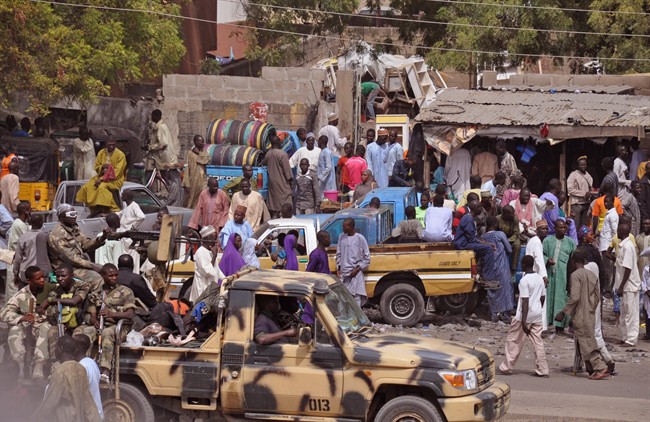DAKAR, Senegal – Nigeria’s electoral commission will postpone Feb. 14 presidential and legislative elections for six weeks to give a new multinational force time to secure northeastern areas under the sway of Boko Haram, an official close to the commission told The Associated Press on Saturday.

Millions could be disenfranchised if next week’s voting went ahead while the Islamic extremists hold a large swath of the northeast and commit mayhem that has driven 1.5 million people from their homes.
READ MORE: Nigeria, neighbours promise 8,750-strong force against Boko Haram by next month
Civil rights groups staged a small protest Saturday against any proposed postponement. Police prevented them from entering the electoral commission headquarters in Abuja, Nigeria’s capital. Armed police blocked roads leading to the building.
Electoral officials were meeting with political parties Saturday, asking their views on a postponement requested by the national security adviser, politician Bashir Yusuf told reporters. He said the adviser argued the military will be unable to provide adequate security for the elections because of operations in the northeast.
The Nigerian official, who is knowledgeable of the discussions, said the Independent National Electoral Commission will announce the postponement later Saturday. He spoke on condition of anonymity because of the sensitivity of the issue.
A major offensive with warplanes and ground troops from Chad and Nigeria already has forced the insurgents from a dozen towns and villages in the past 10 days. Even greater military strikes by more countries are planned.
On Saturday, regional and African Union officials announced that Nigeria and its four bordering countries planned to deploy an 8,750-strong force against Boko Haram by next month. The plans, announced at the end of a three-day meeting in Cameroon, call for Chad and Nigeria to contribute 3,500 troops each, while Cameroon and Niger would contribute 750 each and Benin would contribute 250. The force would be headquartered in Chad’s capital, N’Djamena. Details of funding, with the Africans wanting the United Nations and European Union to pay, may delay the mission.
Nigeria’s home-grown extremist group has responded with attacks on one town in Cameroon and two in Niger this week. Officials said more than 100 civilians were killed and 500 wounded in Cameroon. Niger said about 100 insurgents and one civilian died in attacks Friday. Several security forces from both countries were killed.
International concern has increased along with the death toll: Some 10,000 killed in the uprising in the past year compared to 2,000 in the four previous years, according to the U.S. Council on Foreign Relations.
The United States has been urging Nigeria to press ahead with the voting. U.S. Secretary of State John Kerry visited Nigeria two weeks ago and said that “one of the best ways to fight back against Boko Haram” was by holding credible and peaceful elections, on time.
“It’s imperative that these elections happen on time as scheduled,” Kerry said.
The elections had been called early. Elections in 2011 were postponed until April. May 29 is the deadline for a new government to be installed.
Officials in President Goodluck Jonathan’s administration have been calling for a postponement.
Any delay is opposed by an opposition coalition fielding former military dictator Muhammadu Buhari, though the opposition stands to take most votes in the northeast.
Supporters of both sides are threatening violence if their candidate does not win. Some 800 people were killed in riots in the mainly Muslim north after Buhari, a Muslim, lost 2011 elections to Jonathan, a Christian from the south.
Analysts say the vote is too close to call, the most tightly contested election since decades of military dictatorship ended in 1999.
Jonathan’s party has won every election since then but the failure of the military to curb the 5-year Islamic uprising, growing corruption and an economy hit by halved oil prices have hurt the president of Africa’s biggest oil producer and most populous nation of about 170 million.
A postponement also will give electoral officials more time to deliver some 30 million voter cards. The commission had said the non-delivery of cards to nearly half of the 68.8 million registered voters was not a good reason to delay the vote.



Comments